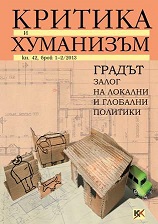Българският постсоциалистически град: трансформация на публичното пространство, глобализация и идентичност
The Bulgarian Post-Socialist City: Transformation of Public Space, Globalization and Identity
Author(s): Aneta Vasileva, Emilia KalevaSubject(s): Cultural history
Published by: Фондация за хуманитарни и социални изследвания - София
Keywords: heteropolis; elitarian public space; postmodern global city; postsocialist urban transformation; monument; iconic building
Summary/Abstract: This text traces the dubious adaptation of the Bulgarian post-socialist city to the contemporary globalization processes and the inevitable transformations produced by it. It analyzes whether our city corresponds adequately to the postmodern heteropolis – a term coined by Charles Jencks, a historian of architecture, to signify the specifi c condition of the contemporary city with powerful growing fragments that contain the core of a mixed and complex urbanism offering an alternative to the dominant paradigm of the classical modernist urbanism. Through multiple examples, this text attempts to prove that de-sacralization of ideologically charged public spaces is a step towards such adequacy. Herein, “ideologically charged spaces” refer to the formal public zones for demonstration of the totalitarian ideology that are subjected to forced, centralized urban interventions. Eventually, it is concluded that exactly this desacralization gives the contemporary post-socialist Bulgarian city that spirit of freedom and heterogeneity which would most successfully facilitate its entering into the fi eld of the global heteropolis.
Journal: Критика и хуманизъм
- Issue Year: 2013
- Issue No: 42
- Page Range: 95-108
- Page Count: 14
- Language: Bulgarian
- Content File-PDF

